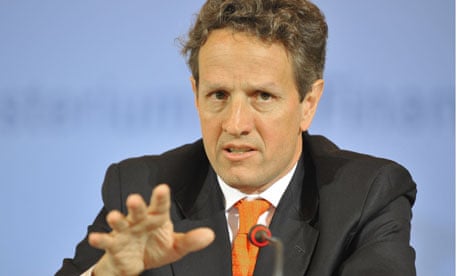A political offensive to calm jittery markets bore fruit today when shares rallied in London, Frankfurt and Paris by more than 3%.
Timothy Geithner, the US treasury secretary, on a whistlestop tour of European capitals, put aside differences over banking reform to emphasise the fact that countries were working together to balance the slashing of deficits with supporting economic growth. But the difficulties facing European leaders as they try to cut budget deficits were underlined as the Spanish government only just managed to squeeze its €15bn (£12.7bn) package of cuts through parliament by one vote.
Speaking in Berlin, Geithner deflected worries that austerity measures could lead to an economic setback. He underlined the need to reduce debt "to sustainable levels over the medium term" and added that "we're going to get there at somewhat different paces".
German finance minister Wolfgang Schäuble put aside weeks of in-fighting between European politicians to make clear Germany's resolve to make the eurozone "stability and growth pact" work and said countries would try to do justice to both elements.
Schäuble and Geithner's comments came after China's main sovereign wealth fund voiced concerns about the volatile situation in Europe. Shares have fallen by 10% since mid-April when worries about unprecedented debt levels in the eurozone triggered a flight of investors.
Bond markets, which buy and sell government debt, have become concerned at the level of debt in Greece, Portugal and Spain and the difficulties they face in stimulating growth.
In addition to the Spanish move , Greece and Portugal have begun to reduce public sector spending. Italy's centre-right government approved an emergency budget this week aimed at reducing the deficit by €24bn over the next two years, including an immediate freeze on public sector wages.
Britain is cutting about £18bn this year after the government agreed to push through £6bn of cuts on top of £12bn already instituted by the previous Labour administration.
Some economists fear the austerity cutbacks to appease the bond market may help kill off Europe's hesitant economic recovery by withdrawing government stimulus efforts too soon.
Some major investors also fear that governments, faced with civil unrest and strikes, will fail to carry through reductions in public spending. Hundreds of thousands of French workers went on strike today to protest at plans by the Sarkozy administration to increase the pension age from 60 to 62. About 30% of flights were cancelled at Paris-Orly airport while many commuters were unable to reach their desks as Paris railway workers took to the streets in protest.
Some unions say France's pension budget shortfall could be reduced by raising workers' monthly contributions.
"Even though we need pension reform, extending the retirement age is the most unjust way," the head of the CFDT (Confédération Française des Travailleurs Chrétiens) union, François Chérèque, said. He criticised "the purely financial logic" of the government's plan and its "obsession ... with aligning with Germany" on retirement policy. Spanish unions have vowed to block planned cuts in public sector staff levels and cuts in wages. They have threatened to call a general strike if the socialist government of prime minister José Luis Rodríguez Zapatero pushes ahead with measures that undermine the country's progress over the last 10 years.
Analysts said unions would be emboldened by a concerted effort to block Zapatero's plans in parliament which meant the measures went through by only one vote. The socialists needed only a simple majority to get the measures approved and would have failed if not for a series of abstentions.
The package was slammed by all opposition groups, with Mariano Rajoy, head of the leading conservative opposition Popular party, calling the measures "improvised, insufficient and unjust".
Germany, which has pushed other eurozone members hard into reining in spending, welcomed the Spanish vote.
"We can only achieve long-term stability of the euro if every member state of the European currency union makes its contribution through structural measures," said German economy minister Rainer Brüderle. "Effective consolidation of budgets is a crucial means of doing this.

Comments (…)
Sign in or create your Guardian account to join the discussion